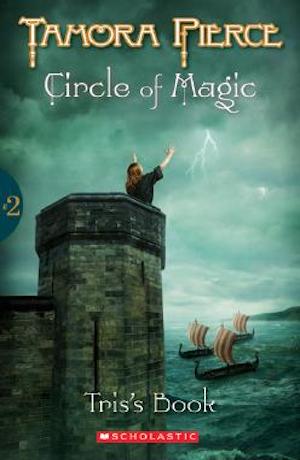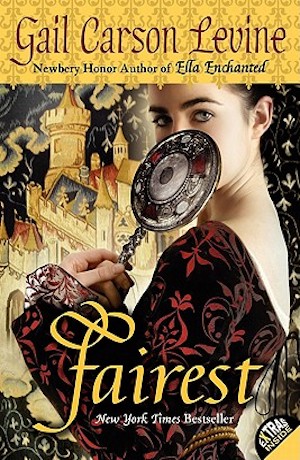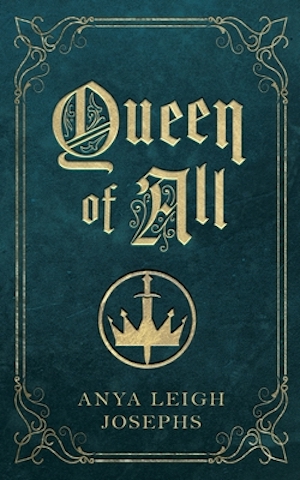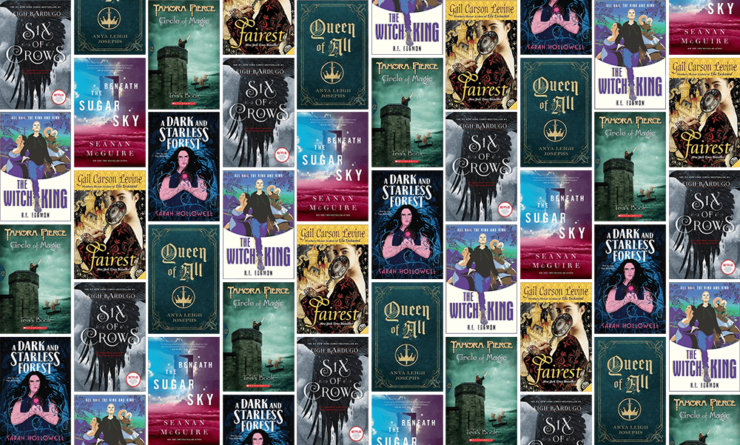The YA fantasy I grew up with had a paradox at its heart.
I wanted to be just like the heroes from these books, whose stories spoke to my experiences: feeling like I looked different than everyone else, like I didn’t fit in, knowing that my peers didn’t like or accept me, thinking that grown-ups couldn’t understand why I felt so isolated.
And yet I never once actually saw myself in these books. The heroes of these novels were invariably white, able-bodied, heterosexual, and cisgender. (Fortunately, this has started to change in the intervening years.)
They were also invariably thin. This has not changed very much at all.
The irony here is that the very reason I was so drawn to YA fantasy as a genre was because I was a fat child, who has since grown into a fat adult. I wanted desperately to believe that there could be a world, even an invented one, where the things that made me different could be okay, could even be good. If other people didn’t like or understand me, it was because they were close-minded or cruel. Being an outsider meant that I was a chosen Harry Potter, and everyone who picked on me was an unmagical Dursley. I was a brave Katniss, while the classmates who bullied me were the shallow and vicious denizens of the Capital. I was a clever Tiffany Aching, saving the world on behalf of ungrateful parents and teachers too caught up in their own normalcy to see how important I was.
I was like these characters, because they were outsiders in a world that could not understand what made them special, and so was I. They felt lonely, the way I did. They even obsessed about looking different from everyone around them, as I did (consider the quantity of YA fantasy heroines who are insecure about being the only brown-haired girl among blonde siblings!) But I was also not like these characters, because, unlike any of them, I was Jewish, and queer even if I didn’t know it yet, and chronically ill, and fat. So as I read these books, again and again, I got the message: here, too, I was not wanted. Even in a made-up world, where dragons soared through the skies and magic was an everyday occurrence, no one could imagine anything as absurd as someone like me being a hero.
That’s putting it a little bit dramatically, of course. (Forgive me. I’m a writer, it’s my job). In fact, matters are improving in representation in books across the board. Publishing has made a strong push towards diversity and inclusion in recent years, with movements like We Need Diverse Books and the call for #ownvoices spurring some much-needed changes. Yet these changes aren’t enough, leaving out many marginalized groups, including fat people. (I use the word fat here, and throughout the essay, because it is my preferred term and the one most commonly used in the fat liberation movement). Fat protagonists, especially in YA fantasy, are still few and far between, and unfortunately many of the portrayals of fat characters fall far short of providing positive representation for the many readers longing for it.
For readers looking for fat representation in YA fantasy, I wish I had better recommendations to offer after a lifetime of searching. Here are a few, most with caveats:
Nina from Six of Crows by Leigh Bardugo

The author has confirmed that she intended this character to be “chubby” and self-describes as fat, making this a rare example of an #ownvoices fat character in a bestselling YA series. Nina is, in many ways, wonderful representation for fantasy readers looking for fat characters. She is bold, confident, and loyal. She is also seen as charming and attractive, a rare thing for a fat character in any media. Unfortunately, Nina’s fatness has been erased in the recent Netflix adaptation of Bardugo’s works, Shadow and Bone, where she is played by Danielle Galligan, a thin actress. For me, the erasure of one of the few fat fantasy protagonists we have is enough to make me not want to watch the show, so I can’t comment on it beyond my disappointment that Nina’s fatness didn’t make it into the show. If there are few fat characters in fantasy books, there are even fewer in fantasy shows and movies, and it really saddens me that this adaptation squandered a chance to do something really radical in Nina’s representation. That said, the books still stand as a great example of truly inclusive fat representation in YA fantasy.
Trisana Chandler from Tamora Pierce’s Emelan series

Tris is one of the four heroes of Tamora Pierce’s Emelan books, which begins with the Winding Circle quartet. These books tell the story of four young mages whose magical powers manifest in unusual ways (Tris’s powers are based on the weather), who find a family in each other as they learn to control and eventually master their magic. Each of the four protagonists has their own book and their own challenges fitting in. Tris is short-tempered, enormously magically powerful, and ferociously intelligent. A well-rounded, narratively-developed, indisputably heroic main character, she is also fat. Her books give a heart-wrenchingly relatable account of what it’s like to grow up as a fat girl. Other children bully her by calling her “fatty,” her family only gives her clothes that are too small for her body, and she is plagued by insecurity about many things, including her looks. Tris’s story can’t offer readers an escape from fat-shaming, but she is a true fat YA fantasy hero. (Tamora Pierce’s other books also offer a wealth of body-diverse characters, like the broad-shouldered, tall Keladry of Mindelan, who have to overcome stigma about how they look in order to embrace their heroic destinies).
Aza in Gail Carson Levine’s Fairest

In this companion novel to her celebrated Ella Enchanted, Gail Carson Levine retells the Sleeping Beauty myth with a heroine who, despite her beautiful singing voice, kindness, and devotion to her family, despises herself because she is ugly. Specifically, she describes herself as being “doughy” and “broad as the corridor”. She’s called “prodigious” and “vast,” with a waist like a “tree-trunk”. I also resonated with the way she constantly compares herself to other women, thinking of them as smaller, more delicate, and therefore more worthy. It’s lovely to see a truly compassionate character like Aza depicted as fat. However, there are also some things about the depiction of fatness in Fairest that might be hurtful. Fatness is conflated with ugliness, and Aza is mistreated for both. She is magically transformed into a beauty over the course of the book, which explicitly makes her smaller. That said, she also has a prince who adores her—specifically, who “loved her size from the first”, and comes to understand how painful and destructive the quest for beauty, and thinness, can be. Given how central the fairytale love of the beautiful princess and handsome prince are to our cultural ideals, Carson’s choice to give a fat heroine the role of the “fairest of them all” is pretty radical.
Cora from Beneath the Sugar Sky by Seanan McGuire

Seanan McGuire is renowned in fantasy circles for her radical choice to directly name the identities of her characters, and Cora, the hero of Beneath the Sugar Sky, is no exception. Cora describes herself as fat in the very first chapter, recounting how she was taught by a lifetime of mistreatment to hate her own body—and the surprising wonder of finding herself in a new world where no one mocks her for being fat. McGuire perfectly depicts many of the experiences of growing up as a fat child: others assuming that Cora is lazy or unhealthy, Cora’s fear of eating in front of other people who might mock her, even the way others encouraged her to diet to the point of disordered eating. I’ve never seen these experiences represented in a fantasy book before. What’s more, the whole series that Beneath the Sugar Sky is part of seems to be built around solving the very problem I introduced at the beginning of this essay: in this world, part of what makes the series’ titular “wayward children” leave their own worlds for fantastic adventures in others is the fact that they don’t fit in at home—because of their sexual orientation, their gender identity, their disabilities, or because, like Cora, they are fat. Although, like most of the other characters on this list, Cora’s story revolves around the fat-shaming she experiences from others and from herself, she also provides exactly what I felt I was missing as a young adult reader myself: a fat character whose fatness makes her different, and whose differentness makes her a hero.
The hopeful news I can offer is that this is starting to change. Most of the books on that list are fairly recent. As the push for increased diversity in fiction meets the growing body positivity movement, I think there will be more and more YA novels with fat protagonists. I’m excited for Sarah Hollowell’s A Dark and Starless Forest, for example—although I haven’t read it yet (it’s not out until September) it has a fat protagonist right on the cover. So does H.E. Edgmon’s soon-to-be-released The Witch King, which I’m also looking forward to for queer and trans representation.
My own upcoming debut novel, Queen of All, has two fat protagonists. Sisi is a beauty, self-confident and headstrong. Jena, the narrator, on the other hand, is self-conscious, anxious, and shy. I’ve tried to bridge some of the gaps in fat representation with this book, just as I know many of my fellow authors have in the books above and in others. I’m also sure I’ve gotten things wrong, and that parts of the representation in Queen of All may end up feeling more hurtful than helpful. Some readers might wish for a book where Jena’s weight isn’t part of her struggle with self-esteem. Others might feel like, because Sisi is admired as a beauty, their experiences of being shamed for their fatness are erased.
There is still so much missing. Where are the fat protagonists who unapologetically love themselves, who are admired instead of shamed? Where are the big-budget TV and film adaptations with fat characters at the center? Where are the fat protagonists who are also Black, trans, physically disabled, bisexual, Native, and so many more intersectionalities of experience? A handful of books can’t solve the paradox of YA fantasy’s exclusion of the readers who need it most. My one book certainly can’t.
However, as more authors dare to put fat characters at the center of fantasy stories—and as readers encourage us by supporting them—we can, together, change the story we are telling young readers. Considering the pervasiveness and cruelty of fatphobia, young readers deserve to be able to escape into fantasy, and to see themselves belonging in the stories they love.
Buy the Book


Queen of All
Anya Josephs was raised in North Carolina and is now pursuing a career in social work in New York City. When not working or writing, Anya can be found seeing a lot of plays, reading doorstopper fantasy novels, or worshipping their cat, Sycorax. Anya’s short fiction can be found in Fantasy Magazine, Andromeda Spaceways Magazine, and Mythaxis, among many others. Their debut novel, Queen of All, is an inclusive adventure fantasy for young adults available now.










